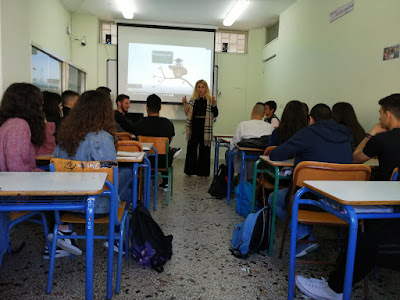Due to the current situation of the country, all schools have seen their resources being reduced to minimum rates, which has made teachers assume many other tasks apart from teaching (administration, councelling, caretaking and so on). I was shocked to learn this but at the same time I was glad to see how well they are doing with the little support they have from the authorities.
The first lesson of the day was Latin. My colleague Darío and the students enjoyed a lovely lesson about Catullus where he showed them how current and interesting the study of Latin can be:
 |
| The Latin lesson with my colleague Darío and Mrs Anastasia Lithoxoidou. |
Apart from the lesson, the display of the classroom was so inspiring that it was difficult for the students not to get engaged. The students told us that they had designed the classroom according to their interests and that they were allowed to stay there during the breaks. They also told us that they felt more comfortable and motivated to take part in the lesson in this classroom than in a regular classroom. Apart from a whiteboard, tables and chairs (which encourage group working and discussion), the classroom had a fridge, a table football, a bookcase with books of their choice, an inspirational wall, a photo call area, some puffs, toys and decorative lighting on the teacher's desk:
 |
| Detail of the inspirational wall, the fridge, the toys and the decorative lighting. |
Afterwards, we met the English teachers, Lia Lefaki and Katerina Katsara. They told us that, due to the latest educational reform, they are forced to use a given textbook in class (they gave us a sample of the one they use with the second-year groups). The most important thing that I learnt from them was that the approach is completely different from the approach we have in Spain. English lessons are no longer language-focused but content-focused: they use English as the working language of a class devoted to literature, philosophy, sociology, psychology and so on.
 |
| Mrs Katsara's English lesson: critical thinking and logical fallacies. |
I must admit that this lesson was absolutely eye-opening to me. At first, students seemed reluctant to participate, but when the Spanish teachers started to take part in the discussion they changed their attitude and opened to us in a way that I had never seen before. They used English quite proficiently in order to express their opinions and thoughts about complex issues. However, what really grabbed my attention was not only their use of English but also the depth or their arguments when discussing with us. And this is something that the Greek educational system fosters from early stages in a more efficient way than the Spanish system does. Both students and us were so engaged in the lesson that they preferred to stay in class for one more period rather than enjoying a free period they had after the English class. So this impressive lesson was one hour and forty minutes long, since lessons are 45 minutes long plus a ten-minute break.
I thought that the speaking activities in my English lessons are so shallow if compared to what I was watching at that moment that I would definitely try to change my ways back in Spain.
No hay comentarios:
Publicar un comentario